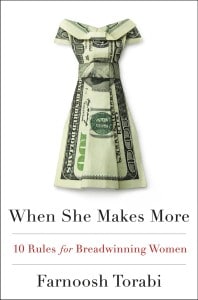For a lot of historic and cultural reasons, men on average make more money than women. But averages are just that, and in many families, the wife earns more money than the husband. This shakes up traditional relationships, and not always for the better. How should people deal with that?
 Farnoosh Torabi has some ideas. She is a personal finance expert and author of a new book, When She Makes More: 10 Rules for Breadwinning Women. We caught up with her to get her advice on how families can stay strong in nontraditional situations.
Farnoosh Torabi has some ideas. She is a personal finance expert and author of a new book, When She Makes More: 10 Rules for Breadwinning Women. We caught up with her to get her advice on how families can stay strong in nontraditional situations.
Q. What kind of research did you do for this book?
A. I spent two years poring over existing research related to gender, money and income and conducted my own academic survey of over 1,000 women nationwide. I interviewed dozens of breadwinning women and, in many cases, their partners. I also tapped behavioral psychologists, gender experts, relationship coaches, sociologists and family therapists for their insights. As a breadwinner in my marriage, I incorporate my own personal anecdotes and experiences, too.
Q. What are some sources of conflict when the woman makes more than the man?
A. Some of us are holding onto antiquated ideals about the roles men and women should play in a marriage. I discovered in my own survey when she makes more, she doesn’t entirely enjoy the role nor the stress and burdens that go with it. Some women – and men – wouldn’t mind if the financial roles were reversed, in fact. This dynamic where SHE earns the bigger paycheck can lead to feelings of guilt and shame and questions of identity for both sexes. Some of that is due to our old- fashioned brains and DNA which haven’t evolved fast enough and caught up to modern culture. Our primitive instincts are holding us back, somewhat.
Part of the conflict also stems from societal pressure that maintains that “real” men are supposed to be able to provide for their families. A study by Pew Research found that 66% of Americans believed it was “very important” that a man be ready to support a family before getting married, while only 33 percent believed the same about women.
Q. How do these conflicts differ from other sources of financial conflict? For example, what if the family is also trying to get out of debt? What if the husband is newly retired?
The conflicts related to a relationship where she is the breadwinner have much to do with our gender expectations, biology and societal pressure to live life a certain way. Emotionally, it can be a lot more complicated.
Q. Is this something that we’ll grow out of as a society as this becomes more common?
I hope so. Although, you’d expect that by now we’d have come further along. As I’ve learned from interviewing psychologists for the book, our primitive instincts are quite strong and hard to combat. While our intelligent brains may tell us that we ought to keep pace with the changing times and that it should not matter who earns more in a relationship, our lower brains that address our primal needs have yet to catch up and can keep us stuck.
Q. What is your single best piece of advice for families dealing with this?
Rather than dwell on the challenges, focus on some of the unique benefits of having a female breadwinner in the household – and appreciate them.
For one, with mom working, the family can be extra secure. A breadwinning wife who may be on a more secure career track can provide that cushion and prevent inevitable financial rough patches for the family.
Her higher salary may also allow her to invest in her husband’s earnings potential. With her financial help he could pursue a graduate degree, change careers, or start a business in pursuit of more income. It’s the kind of investment that can pay off for everyone in the family, especially if kids are in the picture down the road.
Finally, dads having more quality time with the kids is something else busy, top-earning moms tell me they greatly appreciate. Whether he’s a stay-at-home father who manages the household day-to-day or has the more flexible work schedule, a father who makes less can sometimes bring more to the table as an active and involved parent. And that, researchers say, is an important factor in a happy marriage.
